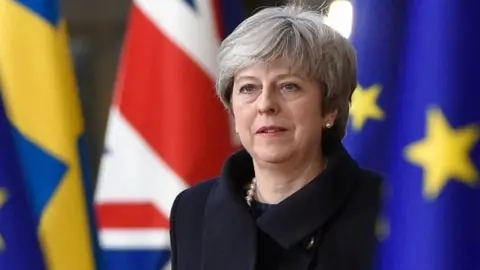How could Theresa May get a Brexit deal through Parliament?
 AFP
AFPForget about Brussels for a moment - and whether Jean-Claude Juncker was really having a pop at Theresa May yesterday or, as seems more likely, being a human being and having a little joke.
(If you haven't seen it, you can catch the May-Juncker digital dance-off at the bottom of this page...)
If you assume there is a Brexit deal done in Brussels, there are dark warnings today about whether that can get through Parliament once it gets back.
Steve Baker, the massively motivated and organised Brexiteer who jumps out of planes for fun, reckons he has at least 40 colleagues who will actually have the bottle to vote against the PM's deal if it is a squishy version of Chequers, or softer still.
And former Remainers like Mark Harper, who used to be the chief whip, say the PM has to think again or risk being defeated. And remember this would be the prime minister losing the biggest vote in years, on the biggest project her government is pursuing.
So, with no majority and the opposition parties having pretty much pledged to vote against, how will the government get it through?
Stand by for an X-rated version of Project Fear with extra parental warnings.
The government's plan is to present the choice not just as deal v no deal, but to make it a decision between what will be described as pragmatic-if-not-perfect v chaotic-no-man's-land.
Doomsday scenarios
One senior minister says "there will be no status quo" - people will be reminded that if they vote against, things don't simply stay as they are, they will crash to "something that's just not acceptable".
The narrative will, for the government, be about making the vote a moment of national significance, a time for MPs to choose country or party, ideology or stability.
Expect the argument to be made with full force along with, it's likely, doomsday scenarios about what would happen to the economy if Parliament kills the deal.
If there is a deal, ministers also hope the dynamic will shift because it will have the might of the EU machine behind it.
Government whips hope therefore that most MPs will in the end be manoeuvred into voting with them - a cross-party scare strategy using every thumbscrew, every inducement, every loyalty, every political threat.
And expect a soundtrack outside Parliament that the country's and Government's future hangs in the balance.
A third way?
But there is a rather unfortunate echo for ministers here. When was the last time Theresa May asked people to make a choice between stability and chaos?
Well, quite. That choice of slogan at the 2017 general election didn't exactly work out well for the PM.
There are more Brexiteers than the size of the PM's notional majority with the DUP, and that hardcore is likely to vote against.
Some centrist Labour MPs who might be tempted to vote for stability rather than uncertainty will be pulled in all different directions by party loyalty too.
Yes there are already efforts to get them on board, but one cabinet minister admits "we can't trust that".
And those pushing for another referendum hope they can put a third option on the table and make it possible for MPs to reject the deal without voting for some kind of Armageddon.
Some of them may well vote against the deal in the hope of making it happen. There is no settled path towards that, but it doesn't mean they won't try.
Of course, what happens will also be shaped by the terms of what Theresa May actually brings back from Brussels next month. If there is a deal, the harder part will await her at home.
As promised - here's that digital dance-off...
